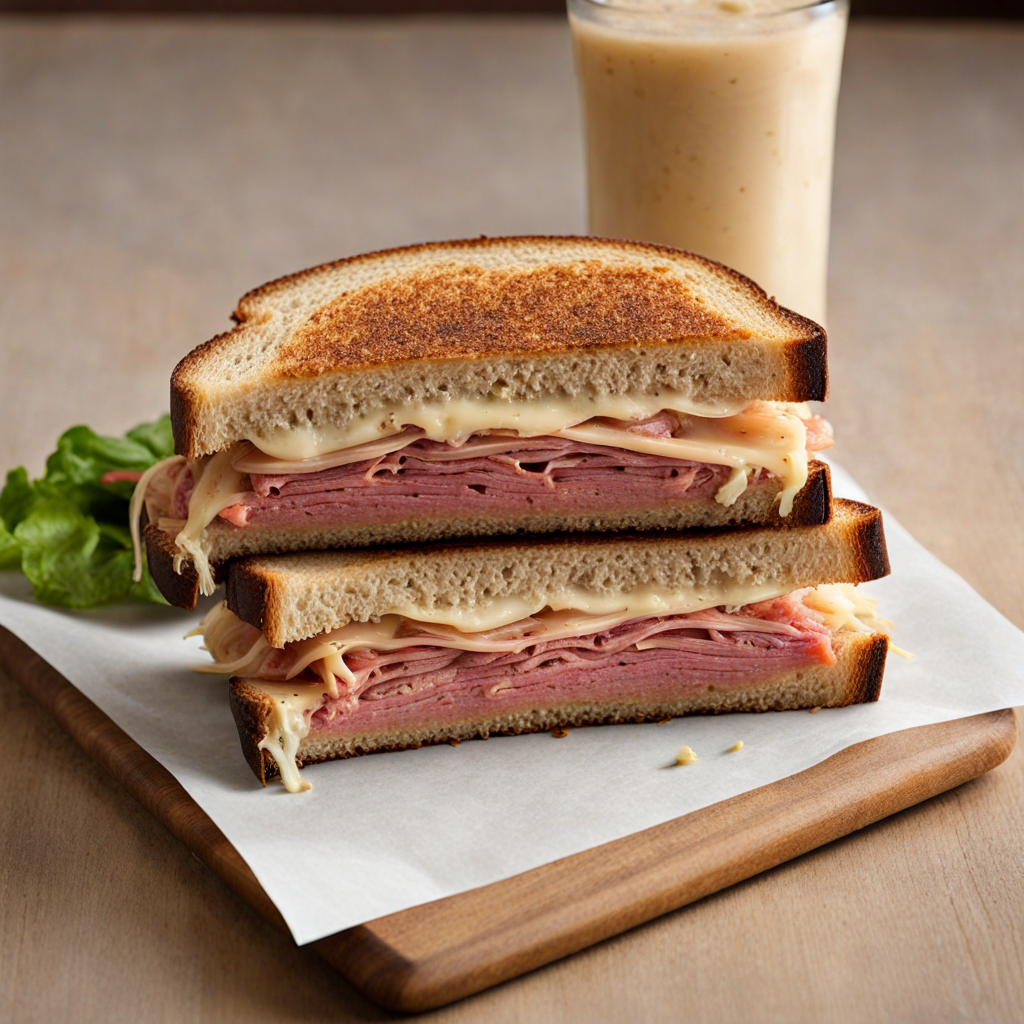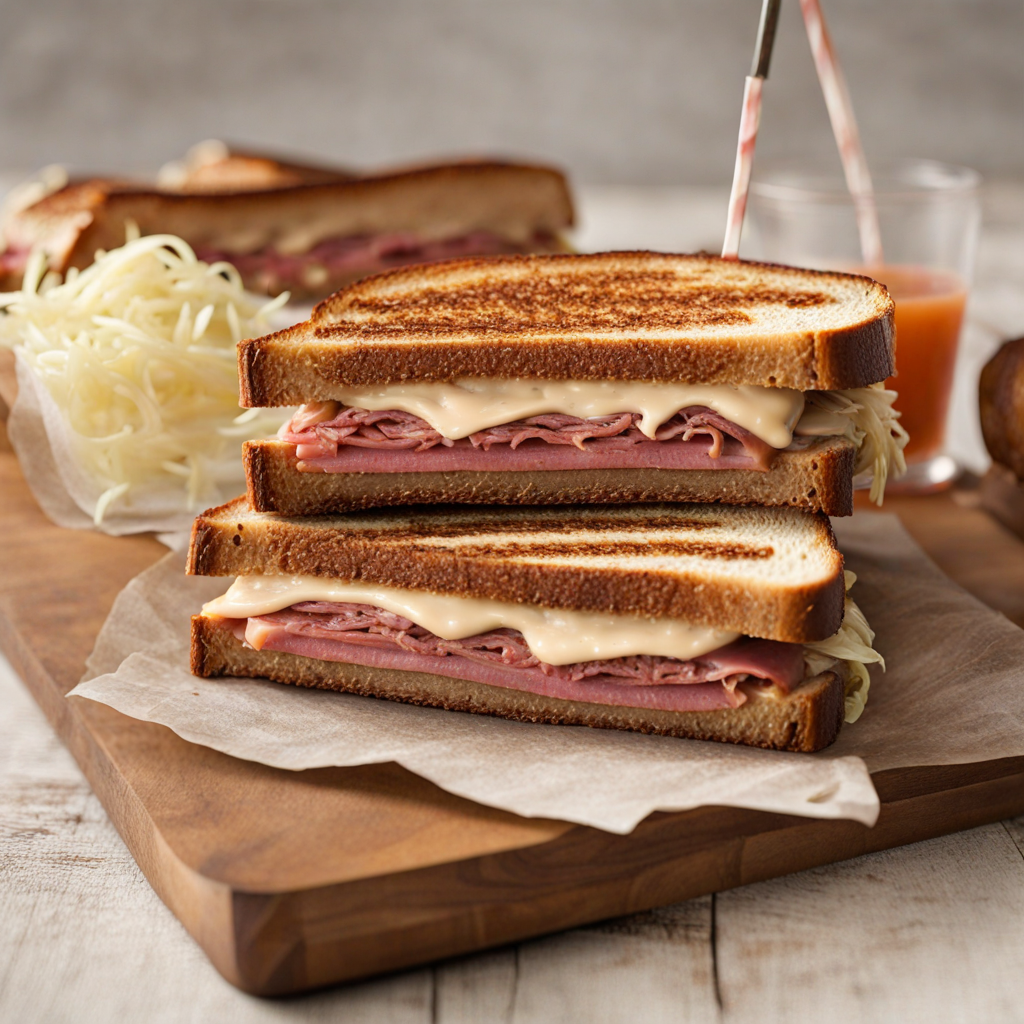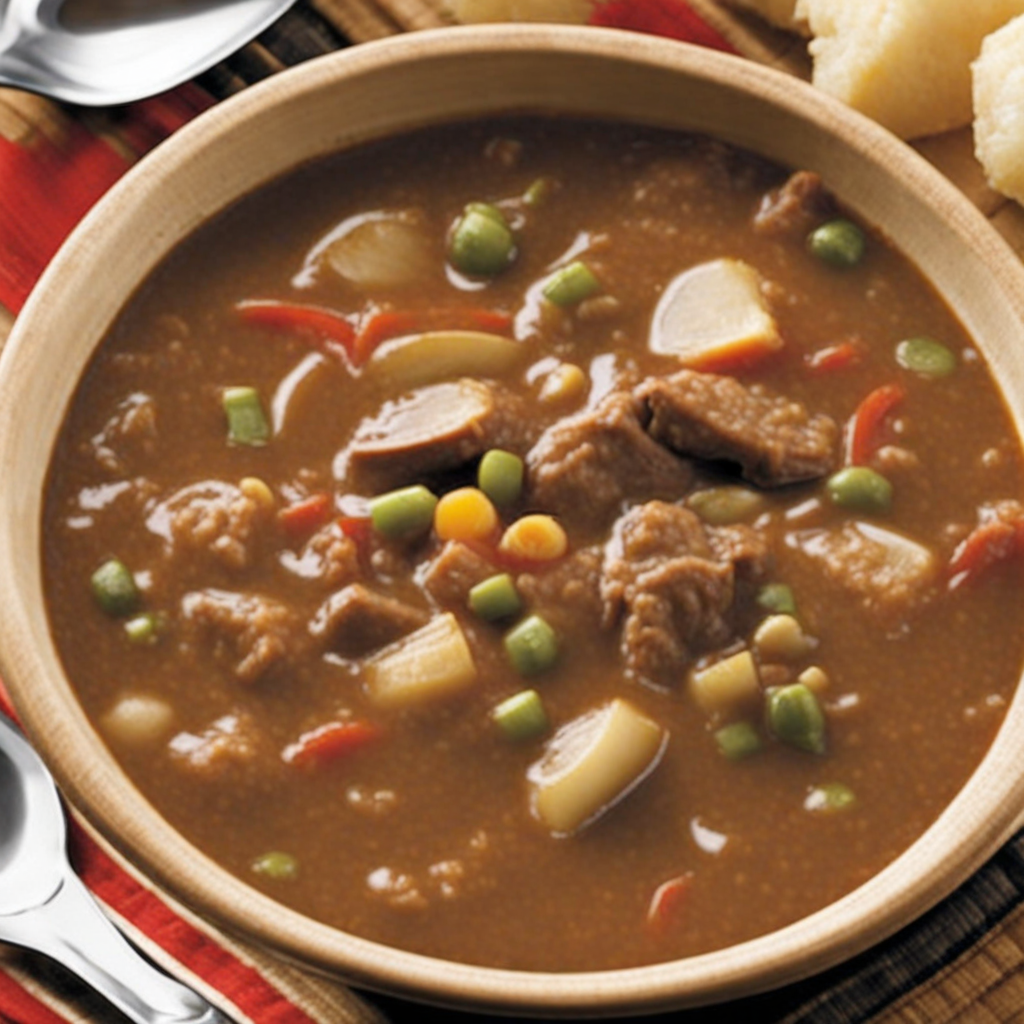Reuben Sandwich
The Reuben Sandwich is a quintessential American deli classic that harmoniously combines flavors and textures, making it a delightful culinary experience. At its core, this sandwich features layers of corned beef, which adds a savory, rich flavor that is both hearty and satisfying. The corned beef is typically complemented by tangy sauerkraut, which brings a refreshing crunch and acidity, balancing the richness of the meat. A generous spread of creamy, zesty Russian or Thousand Island dressing unites the ingredients, adding a sweet and slightly tangy element that enhances each bite. To bring all these delightful components together, the sandwich is traditionally served between two slices of rye bread, which adds a distinctive flavor with its slight sweetness and earthy notes. The rye bread is often grilled or toasted, creating a crispy exterior that encases the warm, melty interior. This toasting process not only enhances the texture but also allows the flavors to meld beautifully, creating a comforting and satisfying experience with each mouthful. The Reuben Sandwich is often accompanied by a side of pickles or potato chips, which provide a delightful crunch and complement the sandwich’s flavors. Whether enjoyed as a quick lunch or a leisurely dinner, the Reuben Sandwich offers a delicious way to explore the combination of savory, tangy, and creamy tastes, making it a must-try for anyone looking to discover a new culinary favorite.
How It Became This Dish
The Reuben Sandwich: A Tasty Tale of American Culinary History The Reuben sandwich, with its hearty layers of corned beef, Swiss cheese, sauerkraut, and Russian or Thousand Island dressing, all nestled between two slices of rye bread, is a celebrated staple of American cuisine. While its exact origins remain shrouded in mystery, the Reuben's rich history reflects the melting pot of cultures that characterize the United States, as well as the evolution of deli culture in the 20th century. #### Origins: A Culinary Debate The precise origin of the Reuben sandwich has been a topic of heated debate among food historians and enthusiasts alike. Two primary claims stand at the forefront of this culinary conundrum. 1. The Reuben’s Jewish Roots: One widely accepted theory attributes the sandwich to a Jewish delicatessen owner named Arnold Reuben in New York City during the early 20th century. According to this account, Reuben created the sandwich in 1914 to please a customer who requested something special. The combination of corned beef and sauerkraut is often seen as a nod to Jewish culinary traditions, where pastrami and pickles are staples. 2. Nebraska's Claim: A competing narrative hails from Nebraska, where a woman named Rueben Kulakofsky is credited with inventing the sandwich for a poker game in the 1920s. According to this story, Kulakofsky assembled the sandwich using ingredients she had on hand, and it quickly became a hit among the players. The sandwich gained traction and eventually made its way to local restaurants, particularly the Blackstone Hotel in Omaha, where it was popularized. Despite these competing claims, both stories share a common thread: the Reuben sandwich emerged from the diverse culinary landscape of America, reflecting the influences of Jewish immigrant communities and the evolving tastes of the early 20th century. #### Cultural Significance The Reuben sandwich embodies more than just a delicious combination of ingredients; it represents the blending of cultural influences that define American cuisine. The 20th century saw a significant transformation in American eating habits, with the rise of delis and diners catering to the burgeoning urban population. The Reuben emerged as a quintessential deli item, appealing to a diverse clientele that included Jewish immigrants, working-class families, and the general public looking for hearty, comforting meals. As America’s cultural landscape shifted, so did the Reuben sandwich. It became a symbol of the Jewish-American experience, reflecting the assimilation of immigrant communities into mainstream society while preserving their culinary traditions. The popularity of the Reuben also coincided with the rise of rye bread and deli meats, which became staples in Jewish cuisine. The sandwich’s success helped solidify the deli as a cultural institution in American life, serving as a communal space for conversations, gatherings, and celebrations. #### Evolution Over Time Throughout its history, the Reuben sandwich has undergone various adaptations and transformations. While the classic version remains beloved, creative interpretations have emerged, showcasing the sandwich's versatility. 1. Regional Variations: Different regions of the United States have put their unique spin on the Reuben. For example, in some areas, the sandwich is made with pastrami instead of corned beef, while others may substitute coleslaw for sauerkraut. The addition of ingredients such as jalapeños or avocado has also gained popularity, demonstrating how local flavors can shape traditional dishes. 2. Health-Conscious Alternatives: As dietary preferences and health consciousness have evolved, so too has the Reuben. Healthier variations have emerged, featuring whole-grain breads, leaner meats, or plant-based alternatives. The rise of vegetarian and vegan diets has led to the creation of veggie Reubens, utilizing ingredients like grilled vegetables or tempeh to create a satisfying sandwich without meat. 3. The Modern Deli: The resurgence of artisanal delis and gourmet sandwich shops in the 21st century has further elevated the Reuben’s status. Chefs and restaurateurs are exploring innovative ways to reimagine the sandwich, incorporating house-made sauces, specialty cheeses, and locally sourced ingredients. This contemporary twist on the traditional Reuben not only caters to evolving tastes but also celebrates the sandwich’s storied past. #### The Reuben in Popular Culture Beyond its culinary significance, the Reuben sandwich has found its way into popular culture, further cementing its status as an American icon. It has been featured in films, television shows, and cookbooks, often symbolizing comfort and nostalgia. Notably, the Reuben is frequently associated with the classic Jewish deli experience, evoking memories of family gatherings and shared meals. The sandwich has also inspired festivals and competitions, such as National Reuben Sandwich Day, celebrated annually on March 14. Events celebrating the Reuben highlight its popularity and cultural significance, bringing together food enthusiasts and communities to honor this beloved dish. #### Conclusion The Reuben sandwich is more than just a delicious meal; it is a testament to the rich tapestry of American culinary history. From its debated origins to its status as a cultural icon, the Reuben has evolved and adapted over time, reflecting changes in society, culture, and taste. As America continues to embrace diverse culinary influences, the Reuben remains a beloved staple, forever intertwined with the stories of those who have savored its unique flavors. Whether enjoyed in a classic deli setting or reimagined in a contemporary café, the Reuben sandwich stands as a reminder of the power of food to connect people across cultures and generations. It embodies the spirit of innovation and adaptability that defines American cuisine, making it a cherished dish that will continue to be celebrated for years to come.
You may like
Discover local flavors from United States







